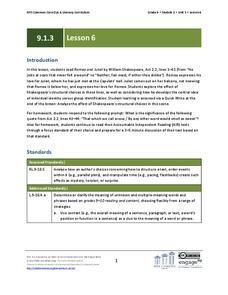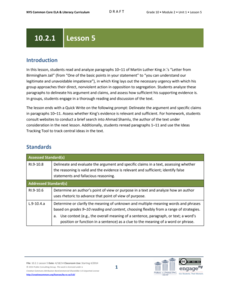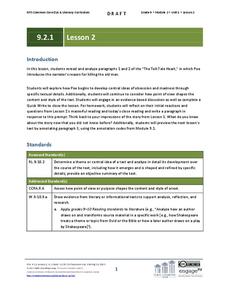EngageNY
Grade 9 ELA Module 1, Unit 2, Lesson 4
As a mid-unit assessment, class members demonstrate their understanding of the concepts covered so far by crafting a formal, multi-paragraph essay in which they analyze how Rainer Maria Rilke's word choices develop the meaning and tone...
EngageNY
Grade 9 ELA Module 1: Unit 3, Lesson 6
The balcony scene from Romeo and Juliet takes center stage as class members consider the structural choices Shakespeare makes, i.e., having Romeo appear first in the scene and having Juliet appear unaware that Romeo is listening to her...
EngageNY
Grade 10 ELA Module 2: Unit 1, Lesson 5
People should always choose their words carefully. Scholars examine the words used by Martin Luther King, Jr. in paragraphs 10 and 11 of his "Letter from Birmingham Jail." Readers answer questions about word use, think about synonyms,...
EngageNY
Grade 10 ELA Module 2: Unit 1, Lesson 8
Readers analyze paragraphs from the "Letter From Birmingham Jail" and determine King's purpose and how he supports it. Scholars discuss given questions with their peers, learn new vocabulary words, and complete a quick writing prompt.
EngageNY
Grade 10 ELA Module 2: Unit 1, Lesson 17
Scholars read the final paragraphs written by Martin Luther King Jr. in "Letter from Birmingham Jail." Readers work in groups to discuss King's word choice and point of view by completing graphic organizers. They also respond to a...
EngageNY
Grade 11 ELA Module 2: Unit 2, Lesson 5
Elizabeth Cady Stanton compares sins to monsters, using a metaphor to make a point about morality. Using the fifth of 14 lessons from the Grade 11 ELA Module 2: Unit 2 series, learners analyze paragraphs 8-10 of "An Address by Elizabeth...
EngageNY
Grade 11 ELA Module 2: Unit 2, Lesson 6
How did the women's rights movement create a ripple effect, improving the lives of future generations? Scholars read and analyze paragraphs 11-12 of "An Address by Elizabeth Cady Stanton," in which the author emphasizes the importance of...
EngageNY
Grade 11 ELA Module 2: Unit 1, Lesson 5
I have an idea! Scholars examine closely how Du Bois develops a central idea in paragraph four of the chapter "Of Our Spiritual Strivings." They also begin finding significant and relevant evidence to support a topic and complete...
EngageNY
Grade 11 ELA Module 2: Unit 1, Lesson 19
Scholars look at paragraphs two and three in the "Atlanta Compromise" speech. They analyze how Washington uses a story about a ship lost at sea and rhetorical devices to develop his point of view. After class discussion and completing...
Gourmet Curriculum Press
Author's Purpose
Who knew determining author's purpose could be turned into a game? Four teams compete to correctly identify the author's purpose for writing a series of passages.
Have Fun Teaching
If I Ran the Zoo
Here's a fresh take on a writing prompt. After a reading of Dr. Seuss's If I Ran the Zoo, primary graders imagine a creature for Dr. Seuss's zoo, write a description of their animal, give it a name, explain what it eats, how it behaves,...
Curated OER
Flag Day
Here are some activities based on Flag Day. Activities include reading a passage, phrase matching, fill-in-the-blanks, multiple choice, spelling, sequencing, scrambled sentences, writing questions, survey, and writing. There is a total...
Curated OER
Thesis Statements
At 32 slides, one would think this presentation on thesis statements is a bit too long, but it is the most important component of a well-written essay! Help your developing writers craft concise, interesting theses with this PowerPoint....
EngageNY
Grade 9 ELA Module 2: Unit 1, Lesson 2
Make up your mind to complete a lesson plan about "The Tell-Tale Heart" and forever rid yourself of simple sentence structures. As ninth graders analyze the first two paragraphs of Edgar Allan Poe's short story, they consider how text...
Macmillan Education
Slang
A four-part worksheet challenges scholars' knowledge of American, Australian, and British slang. Learners use context clues to decide which country a slang word is from, complete sentences, decipher a conversation, and answer questions.
EngageNY
Grade 10 ELA Module 2: Unit 1, Lesson 15
Some things are worth doing again. Scholars take a look to see which ideas Martin Luther King Jr. revisits and refines in his "Letter from Birmingham Jail." To help with the process, readers answer guided questions, look at word...
EngageNY
Grade 10 ELA Module 2: Unit 1, Lesson 18
Examine how Martin Luther King Jr.'s final paragraphs of "Letter from Birmingham Jail" summarize the ideas throughout the piece. Readers discuss word usage and new vocabulary and complete guided questions to better understand how the...
EngageNY
Grade 11 ELA Module 2: Unit 1, Lesson 12
Readers closely examine paragraph nine in Du Bois's "Of Our Spiritual Strivings" to understand prejudice's meaning and research Jim Crow laws.
Curated OER
The Main Idea
In this writing paragraphs worksheet, students review the importance of a clear main idea within a paragraph. Students practice defining a clear main idea by using the ideas in the idea box and matching them with the list of points and...
Curated OER
Frog Paragraph
For this frog paragraph worksheet, students color the picture of the frog given and write a paragraph about it on the lines. Students color 1 frog and write 1 paragraph.
Curated OER
Bird Paragraph
In this picture of a bird learning exercise, students view and color a picture of a bird and then can write a paragraph about it on the lines given. Students color 1 bird.
Curated OER
Paragraph Matching
In this paragraph worksheet, students focus on the usage of a topic sentence and supporting details. Students cut out 6 topic sentences and 6 main body sentences. Students must match each topic to its supporting details.
Curated OER
Parts of a Cell Analogy
Learners reinforce comprehension of the parts of a cell. Theyl synthesize this content knowledge in a descriptive paragraph writing assignment.
Curated OER
Lesson Two: Writing Letters in Code
Combine your friendly letter lesson, grammar lesson, and technology lesson with this fun activity! Young writers compose letters to friends, and then convert the text to Webdings font. Their friends then decode the letter based on a key....

























